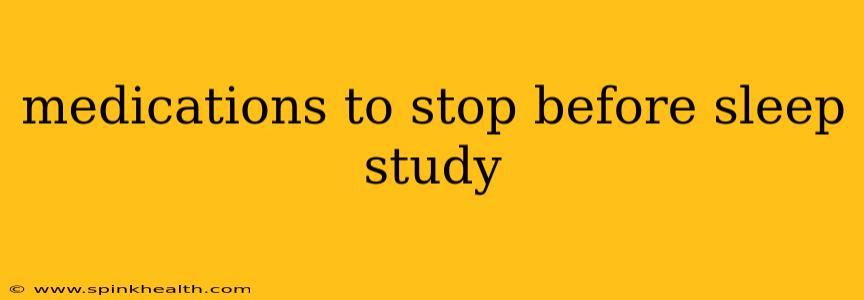Medications to Stop Before a Sleep Study: Navigating the Prep Process
Preparing for a sleep study can feel a bit like navigating a minefield. One of the most crucial, and often confusing, aspects is knowing which medications to stop taking before the test. This isn't a decision you should take lightly; it needs careful discussion with your doctor. Misunderstanding this can significantly impact the accuracy of your sleep study results.
Let's unravel this together, exploring the "why," the "which," and the "how" of medication cessation before your sleep study.
Why Do I Need to Stop Taking Some Medications Before a Sleep Study?
Imagine trying to accurately measure a car's performance while it's running on different types of fuel – the results would be unreliable, right? The same principle applies to a sleep study. Many medications, even over-the-counter ones, can affect your sleep patterns and brainwave activity, the very things a sleep study measures. Stopping certain medications allows for a more accurate and reliable assessment of your sleep architecture, making it easier for your doctor to diagnose and treat any sleep disorders.
Which Medications Should I Stop Taking?
This is where the "talk to your doctor" part becomes absolutely crucial. There's no single, universal list of medications to discontinue. The specific medications you need to stop and for how long depends on several factors, including:
- The type of medication: Some medications, like sleep aids, sedatives, and anti-anxiety drugs, have a direct and obvious impact on sleep. Others, even seemingly unrelated ones like blood pressure medications or certain antidepressants, can have subtle yet significant effects.
- Your individual health condition: Your overall health, other medical conditions, and the severity of your suspected sleep disorder all influence the doctor's recommendations.
- The type of sleep study: Different types of sleep studies may require varying degrees of medication cessation.
Common medication categories that often require discontinuation (always consult your doctor):
- Sedatives and Hypnotics: These are designed to induce sleep, so they inherently interfere with the natural sleep patterns the study is trying to assess. Examples include Ambien, Lunesta, and Sonata.
- Anti-anxiety medications: Benzodiazepines, such as Xanax and Ativan, can alter brainwave patterns and suppress REM sleep, making accurate diagnosis challenging.
- Certain antidepressants: Some antidepressants can affect sleep architecture and may need to be temporarily stopped or adjusted before a sleep study.
- Over-the-counter sleep aids: Even seemingly harmless over-the-counter medications like diphenhydramine (Benadryl) can impact sleep stages.
How Long Before My Sleep Study Should I Stop Taking My Medications?
The timeframe for stopping medication varies widely depending on the specific medication and your doctor's assessment. It could range from a few days to several weeks. Never stop taking any prescription medication without first consulting your doctor. Abruptly stopping certain medications can be dangerous and lead to serious withdrawal symptoms. Your doctor will create a safe and personalized tapering schedule if necessary.
What if I Have Concerns About Stopping My Medications?
This is perfectly understandable! Many people worry about the potential side effects of stopping their medications. This is precisely why having a detailed discussion with your doctor is so important. They can help you weigh the risks and benefits of medication cessation, considering your individual health status and potential consequences. They might suggest alternative approaches, such as adjusting your dosage or substituting a medication with less impact on sleep.
What Happens if I Don't Stop My Medications?
Failing to follow your doctor's instructions regarding medication cessation can lead to inaccurate sleep study results. This can lead to misdiagnosis, ineffective treatment, and a delay in getting the appropriate care for your sleep disorder.
In Conclusion:
Preparing for a sleep study involves careful consideration of your medications. Open communication with your physician is essential to ensure the accuracy of the test and your safety. They will guide you through the process, helping you make informed decisions that protect your health while providing the best possible results from your sleep study. Don't hesitate to ask questions and express any concerns you may have. A well-prepared sleep study sets the stage for an accurate diagnosis and effective treatment.

